This is the first of a series of articles where I will explore the influence of extra-musical elements (literature, paintings, philosophy, etc.) in progressive rock. Because of its wide influence in this genre, Mythology will be spread in several articles. In these articles, I do not intend to make an exhaustive list of references; instead, I will discuss interesting and representative examples.
The influence of mythology in progressive rock (Neo-Baroque Music as I prefer to call it – see my article on the current state of prog: Is Prog Alive and Well? ) is very profound. Bands in all eras, styles, and countries have resorted to mythological stories or characters as a basis for their compositions. In some cases, the whole body of work is based on the musical representation of mythological stories or characters. Usually, this representation is reflected in the lyrics, but there are exceptional examples where only music is used to make a description. The first example, is one of my favorite works by Emerson, Lake and Palmer:
The Three Fates – Clotho, Lachesis and Atropos
In Greek Mythology, these Fates were referred to as the “Morai”. They represented three stages in the life of men:
- Clotho (the spinner) represents the thread of life. She spins and creates the fabric that represents one’s physical incarnation.
- Lachesis (the allotter) with her measuring rod, determined the length of the fabric, that is, the amount of life allotted to the person. It also exemplified chance – the events of life that were not predetermined.
- Atropos (the inexorable) – she cuts the fabric, thus terminating one’s physical life.
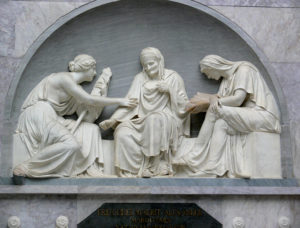
The three Moirai
By Johann Gottfried Schadow – Own work (own photograph), Public Domain, https://commons.wikimedia.org/w/index.php?curid=2122291
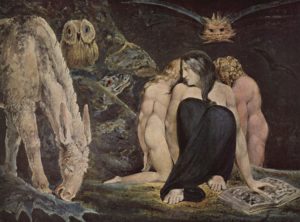
Hekate and the Moirai (The Night of Enitharmon’s Joy), Tate Gallery
By William Blake – The Yorck Project: 10.000 Meisterwerke der Malerei. DVD-ROM, 2002. ISBN 3936122202. Distributed by DIRECTMEDIA Publishing GmbH., Public Domain, https://commons.wikimedia.org/w/index.php?curid=147898
These fates are not attached to specific legends or stories, but are rather a metaphysical representation of the world.
Edward Macan, in his book “Endless Enigma”, makes a fascinating interpretation of this piece:
This theme – technology vs. humanity – is recurrent in the works of ELP, as we already saw in the analysis of Tarkus and as we will see in the analysis of “Karn Evil 9” scheduled for publication in February 2018.
Edward Macan also points out an interesting parallelism with the evolution of Western Music. Clotho, at the beginning of life, is represented by a pseudo-medieval organum. Lachesis, the evolution of life, is represented by a piece inspired in Lisztian romanticism. Atropos, the death of tonality, represented by a Bartókian modernist piece.
The organ in The Three Fates was recorded at the Royal Festival Hall pipe organ.
Here is the studio version of The Three Fates:
Genesis has numerous references to mythological stories and characters. Let’s start with:
Tiresias
You may recall this fragment in the lyrics of “Cinema Show”:
Take a little trip back with father Tiresias,
Listen to the old one speak of all he has lived through.
I have crossed between the poles, for me there’s no mystery.
Once a man, like the sea I raged,
Once a woman, like the earth I gave.
But there is in fact more earth than sea.
What is the meaning of the phrase “But there is in fact more earth than sea?
Tiresias was one of the most famous prophets in Greek mythology, together with Calcas. He was blinded by Hera. Here’s the story:
Tiresias found two serpents mating. He separated them by killing the female serpent with his stick. Hera was displeased and turned Tiresias into a woman. He became priestess of Hera, and even got married and had children. Seven years later, he saw again serpents copulating and this time killed the male serpent with his stick. In doing this, he regained his masculinity.
Because of his experience of having lived in the two sexes, Zeus and Hera asked him to arbitrate in a discussion about what gender experiments more sexual pleasure. When Tiresias replied that men only experiment a tenth of the pleasure of women, Hera, outraged because he revealed her secret, punished him by turning him blind. Zeus gave him the gifts of clairvoyance and a long life.
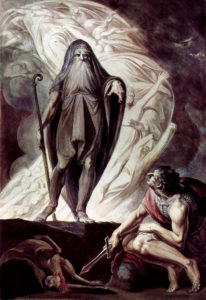
Tiresias appears to Odysseus during the nekyia of Odyssey xi, in this watercolor with tempera by the Anglo-Swiss Johann Heinrich Füssli, c. 1780-85.
By Henry Fuseli – The Yorck Project: 10.000 Meisterwerke der Malerei. DVD-ROM, 2002. ISBN 3936122202. Distributed by DIRECTMEDIA Publishing GmbH., Public Domain, https://commons.wikimedia.org/w/index.php?curid=151197
The Fountain of Salmacis
This beautiful song, from the album “Nursery Crime”, describes the story about how the son of Hermes and Aphrodite became half-man, half-women.
This is the legend:
Salmacis is the name of a spring located near the ancient Mausoleum of Halicarnassus, and it is now a tourist attraction located in present-day Bodrum, Turkey.
It is named after an atypical nymph, who was a naiad nymph. Naiads must live close to sources of water (springs, lakes, rivers); otherwise, they dry and die like a plant.
The virgin Goddess Artemis had a cortege of 20 Naiads, one of whom was Salmacis. She was lazy, unconcerned, self-centered and did not comply with the rules.
On the other hand, Hermaphrodite was the son of Hermes and Aphrodite, who lived in the mountain of Ide. At the age of 15, he decided to travel the world and, upon arriving to the spring where Salmacis dwelled, he decided to take a bath and took off his clothes.
Salmacis fell in love immediately and jumped over him. He tried to escape but Salmacis raped him and forced him into the lake. While embracing Hermaphrodite, she asked the gods that they never be separated again. The gods answered her plea and merged both bodies.
Hermaphrodite cursed the lake so that any men who touched those waters followed his fate….
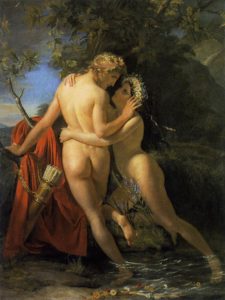
The Nymph Salmacis and Hermaphroditus by François-Joseph Navez (1829)
By François-Joseph Navez – Web Gallery of Art: Image Info about artwork, Public Domain, https://commons.wikimedia.org/w/index.php?curid=4969478
Yes – “Turn of the Century”
This song is based in the well-known myth of Pygmalion and Galatea. This description that follows, is taken from here:
In Ovid’s narrative, Pygmalion was a Cypriot sculptor who carved a woman out of ivory. According to Ovid, after seeing the Propoetides prostituting themselves he was “not interested in women”, but his statue was so beautiful and realistic that he fell in love with it.
In time, Aphrodite’s festival day came, and Pygmalion made offerings at the altar of Aphrodite. There, too scared to admit his desire, he quietly wished for a bride who would be “the living likeness of my ivory girl.” When he returned home, he kissed his ivory statue, and found that its lips felt warm. He kissed it again, and found that the ivory had lost its hardness. Aphrodite had granted Pygmalion’s wish.
Pygmalion married the ivory sculpture changed to a woman under Aphrodite’s blessing. In Ovid’s narrative, they had a daughter, Paphos, from whom the city’s name is derived.
Jon Anderson wrote a story that parallels this myth: it tells the story of the sculptor Roan who, in the grief of his wife’s death, “molds his passion into clay.” The sculpture of his wife comes to life and they fall in love.
This video of “Turn of the Century” describes the story:
King Crimson – “Formentera Lady”
The lyrics to the song, written by Robert Fripp and Peter Sinfield, include an explicit reference to Odysseus’ encounter with Circe:
Here Odysseus charmed for dark Circe fell,
Still her perfume lingers still her spell.
This is the story:
Circe was a minor goddess of magic in Greek mythology, daughter of the Titans Helios, god of the sun, and Perse, an Oceanid.
She is best known for her role in Homer’s Odyssey. During their adventures towards Ithaca, Odysseus and his companions reached the island of Ea, where the residence of Circe was. She invited them all to a grand feast, which a lot of Odysseus’ companions attended but not him. At the feast, one of the dishes was laced with a magical potion; when Odysseus’ companions ate it, Circe made a quick move with her wand and turned them into pigs and other animals, according to their real character. Only one of the companions escaped unharmed and informed Odysseus. The hero, after taking advice from Hermes, protected himself from the spell by using a holy herb, and managed to befriend Circe and save his companions.
Odysseus stayed with Circe for a year of pleasures (only a month according to others), but never forgot Penelope.
It is possible that the island of Ea, where Circe’s Palace is located, could correspond to an island in the Balearic archipelago. This is why Circe is referred to in the song as the “Formentera Lady”. As a curiosity, the Balearic Islands host a rare species called Ibizan Wall Lizard that is referenced in the lyrics:
Dusty wheels leaning rusty in the sun;
Snuff brown walls where Spanish lizards run
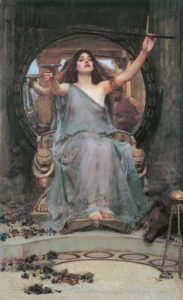
Circe offering the cup to Odysseus. Painting by John William Waterhouse Oldham Art Gallery
http://moontale.egloos.com/865206, Public Domain, https://commons.wikimedia.org/w/index.php?curid=426808
Pink Floyd – Sysyphus
This piece forms part of the double album Ummagumma that features solo pieces by band members. Sysyphus was written and performed by Richard Wright. As with ELP’s “The Three Fates”, it is another fine example where only music is used to describe the myth.
The name “Sysyphus” refers to “Sisyphus”, the Greek mythological hero who tried to cheat death by imprisoning Thanatos himself, only to be sentenced to eternal torture in hell: his punishment is to roll a boulder up a mountainside only for it to fall back down and starting over forever.
This instrumental piece is divided in four parts. I found this accurate description of how the myth is represented musically by Wright, credited to “Astrobreaker” in YouTube:
With this description in mind, let’s listen to this interesting piece:
Renaissance – “Midas Man”
I will finish this first incursion into the world of mythology in progressive rock with Renaissance’s interpretation of the most famous myth of all: The Midas King who turned everything he touched into gold.
This is the story, which you can also read here:
In Greek mythology, Midas was the name of a king in the region of Phrygia in Anatolia, modern-day Turkey. According to the myth, the god Dionysus was trying to find his teacher, the satyr Silenus, who had gone missing after drinking too much wine and wandered off. Silenus was found by the men of Midas, who brought him to the king; Midas recognized him and offered his hospitality for ten days, before taking him back to the region of Lydia, where Dionysus was. The god was so happy that he told Midas he would fulfill one wish for him. Midas asked that everything he touched would become gold, and Dionysus kindly granted the wish.
Midas was particularly excited with his new power and started turning trees and rocks into gold, on his way back home. When he reached his palace, he asked his servants to prepare a grand feast, but to his despair, he soon realized that the food he touched also turned into gold and would soon die of starvation. Even his daughter turned into gold when she greeted her father. Midas, realizing that his wish was actually foolish, prayed to Dionysus, who told him to wash in the river Pactolus; everything he would place in the river after that would also turn back to normal. Midas went straight to the river and felt his powers leave him and flow into the waters. In fact, the sands of the river turned gold, explaining the rich minerals that were found in the river by the ancient inhabitants of the area. Midas, relieved of his bane, decided to deny all riches and retreated to the countryside and became a follower of the god Pan.
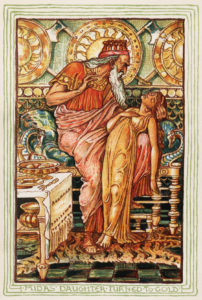
Midas’s daughter turns to a golden statue when he touches her.
Public Domain, https://commons.wikimedia.org/w/index.php?curid=7397327
This video includes the lyrics of the song. Enjoy.

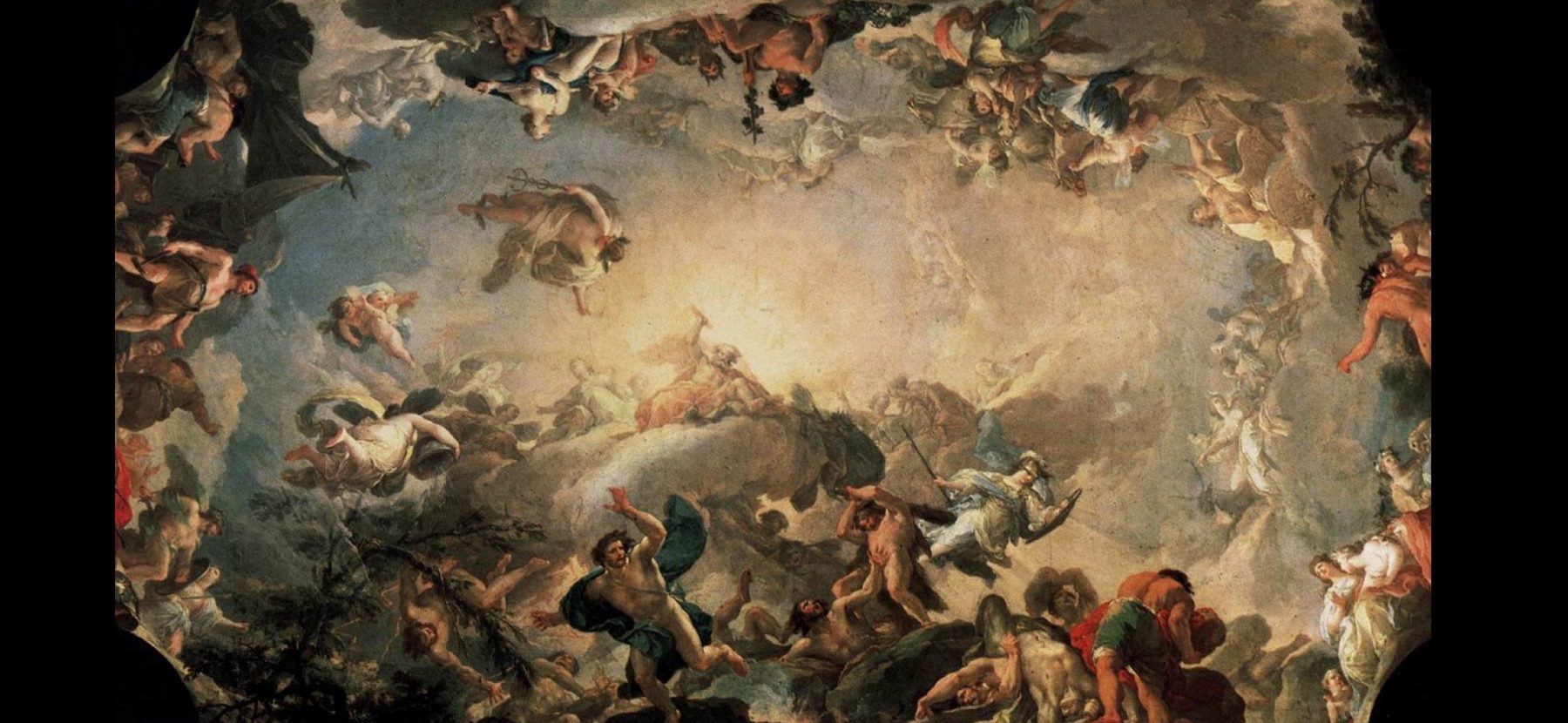

So much has been said and done about mythology because it is imbedded in our human history. Artists explore this to share their interpretations of something that touches them. What more can I say? On our FB Phaedus site I used my early encounter with Rush’s song Hemespheres as Peart’s lyrics develop the battle of heart and mind using mythology as a base. Very interesting themes can be explored. As Joseph Campbell writes there is a huge theme of the hero and transitions of child to man, and many others. “Mythology is not a lie, mythology is poetry, it is metaphorical. It has been well said that mythology is the penultimate truth–penultimate because the ultimate cannot be put into words. It is beyond words. Beyond images, beyond that bounding rim of the Buddhist Wheel of Becoming. Mythology pitches the mind beyond that rim, to what can be known but not told.”
― Joseph Campbell, The Power of Myth
Wow thanks!!
I really love and respect Neil Peart a whole lot because he is such a great artist, poet and musician, I want to post these lyrics here, just to be on this site, he would be proud because it is a a very very good site, even for posperity’s sake, it means something… That is what we are all about isn’t it? We appreciate the artists.
Words by Neil Peart, Music by Geddy Lee and Alex Lifeson
I. Prelude
When our weary world was young
The struggle of the ancients first began
The gods of Love and Reason
Sought alone to rule the fate of Man
They battled through the ages
But still neither force would yield
The people were divided
Every soul a battlefield …
II. Apollo: Bringer of Wisdom
‘I bring Truth and Understanding
I bring Wit, and Wisdom fair
Precious gifts beyond compare
We can build a world of wonder
I can make you all aware’
‘I will find you food and shelter
Show you fire to keep you warm
Through the endless winter storm
You can live in grace and comfort
In the world that you transform’
The people were delighted
Coming forth to claim their prize
They ran to build their cities
And converse among the wise
But one day the streets fell silent
Yet they knew not what was wrong
The urge to build these fine things
Seemed not to be so strong
The wise men were consulted
And the Bridge of Death was crossed
In quest of Dionysus
To find out what they had lost …
III. Dionysus: Bringer of Love
‘I bring Love to give you solace
In the darkness of the night
In the Heart’s eternal light
You need only trust your feelings
Only Love can steer you right’
‘I bring laughter, I bring music
I bring joy and I bring tears
I will soothe your primal fears
Throw off those chains of reason
And your prison disappears’
The cities were abandoned
And the forests echoed song
They danced and lived as brothers
They knew love could not be wrong
Food and wine they had aplenty
And they slept beneath the stars
The people were contented
And the Gods watched from afar
But the winter fell upon them
And it caught them unprepared
Bringing wolves and cold starvation
And the hearts of men despaired …
IV. Armageddon: The Battle of Heart and Mind
The Universe divided
As the Heart and Mind collided
With the people left unguided
For so many troubled years
In a cloud of doubts and fears
Their world was torn asunder
Into hollow Hemispheres
Some fought themselves, some fought each other
Most just followed one another
Lost and aimless like their brothers
For their hearts were so unclear
And the truth could not appear
Their spirits were divided
Into blinded Hemispheres
Some who did not figh
Brought tales of old to light
My ‘Rocinante’ sailed by night
On her final flight
To the heart of Cygnus’ fearsome force
We set our course
Spiralled through that timeless space
To this immortal place
V. Cygnus: Bringer of Balance
I have memory and awareness
But I have no shape or form
As a disembodied spirit
I am dead and yet unborn
I have passed into Olympus
As was told in tales of old
To the city of Immortals
Marble white and purest gold
I see the gods in battle rage on high
Thunderbolts across the sky
I cannot move, I cannot hide
I feel a silent scream begin inside
Then all at once the chaos ceased
A stillness fell, a sudden peace
The warriors felt my silent cry
And stayed their struggle, mystified
Apollo was atonished
Dionysus thought me mad
But they heard my story further
And they wondered, and were sad
Looking down from Olympus
On a world of doubt and fear
Its surface splintered
Into sorry Hemispheres
They sat a while in silence
Then they turned at last to me
‘We will call you Cygnus,
The god of Balance you shall be’
The Sphere: A Kind of Dream
We can walk our road together
If our goals are all the same
We can run alone and free
If we pursue a different aim
Let the truth of Love be lighted
Let the love of Truth shine clear
Sensibility
Armed with sense and liberty
With the Heart and Mind united
In a single perfect sphere
Very pertinent. Thank you Rob!!